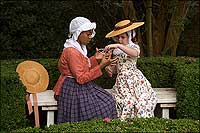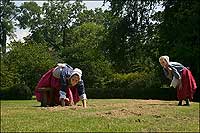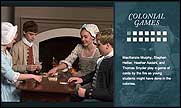Page content
Christmas Earnest & Christmas Game
At heart, Christmas was an oxymoron: serious and silly. Holy day as well as holiday. And sometimes violently.
by Michael Olmert
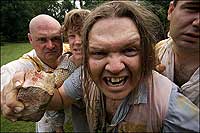
The "beastly fury" of football at times broke out into general mayhem. From left, Edward Merkley, Jonathan Woods, Bill Rose, and Jason Whitehead brandish brickbats as well as team spirit.
IN THE WONDROUS fourteenth-century poem Sir Gawain and the Green Knight, the magical hero rides his great green horse into the hall at Camelot and coolly regards King Arthur's men at their Christmas feast. To him, they're a rabble of "beardless children." What they need, he thinks, is a bit of schooling, a little comeuppance. "And so I call in this court for a Christmas game," he says.
The Christmas game he has in mind involves demonstrating to the proud Sir Gawain that he is cowardly, craven, and full of cheese. It features a chase, a version of hide-and-seek, and a contest of strength and daring. At the finish, the contest teaches Gawain hard truths about himself and Camelot. Still, the instruction seems lighthearted, infused with Christmas joy. The anonymous poet mentions Christmas nine times, capturing that familiar combination of soul searching and frolic still engendered by the season.
So there you have it: the very real linkage of play, children, and Christmas with a sense that games can teach you something. It's an old idea, plainly medieval, and one still in the air in eighteenth-century America. They're kindred epochs, the Middle Ages and colonial Anglo-America, full of the same concerns and fears, heavily dependent on tradition when it comes to pastimes and to belief.
CHRISTMAS GAMES IN NORTH AMERICA are there from the beginning of British colonization. In 1621, Governor William Bradford of Massachusetts orders the citizens of Plymouth to stop playing games on Christmas Day. He mentions "stoolball" and "pitching the bar."
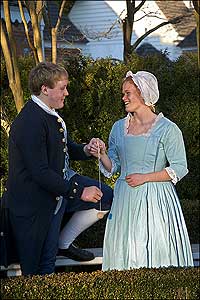
A game of bilbo—catching a ball on a string in a cup—encourages youthful fraternization between Thomas Snyder and Mackenzie Murphy.
In stoolball, a milking stool was used as a target, and a hard leather ball stuffed with feathers or hair was thrown at it. One player threw at the stool while another defended it with a wooden bat. In time, the game evolved into cricket and baseball. It also seems to have spun off a game resembling softball called "rounders," which is still played in England, often by girls.
The game's early association with women likely comes from the image of the milking stool and milkmaids. As Sir Philip Sidney wrote in 1586:
A time there is for all, my mother often sayes,Despite Sidney's mother, stoolball, or any game, could descend into mayhem. In 1410, stoolball was banished from churchyards in John Myrc's Instructions for Parish Priests.When she with skirts tuckt very hie, with gyrles at stoolball playes.
A boisterous version of stoolball's bat-and-ball play was called "shinty." In Scotland, it was played at Christmas and seems to have resembled field hockey or a game called "not" played in Gloucestershire with a ball of knotted string or rope.
Pitching the bar was a game of strength, a log-throwing, or pole-throwing, competition akin to the Highland Scots' tossing the caber. No one today knows just what the play of these games was like, beyond obvious back-formations from modern games. That's often the way it is with history. When an activity is so commonplace that everyone knows what it is, there seems little point in writing it all down. Which leaves the historian in a muddle.
WHY those particular games, pitching the bar and stoolball? Ease of making or finding the equipment, possibly: a log or pole for one game; a ball, a stick, and a milking stool for the other. And there was no particular reason from Christian doctrine for these two games. Any game would do. The play was the thing.
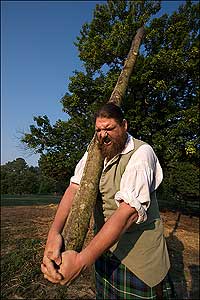
Pitching the bar, similar to tossing the caber, required little more than a hewn log, an open field, and brawn. Dan Hard gives the timber a heave.
Was either of these games played at Williamsburg during the long Christmas season? They almost certainly were, but since most early games are informal, they get scant mention in documents—unless there is an official complaint, as with the stiff-backed and wintry Governor Bradford.
Useable documentation about play mainly surfaces when games get out of hand and attempts are made to regulate or stop them. Because Christmas games got right up Puritan noses, by 1659 anyone in Massachusetts caught not working at Christmas or observing the feast day in any way, especially at play, was to be fined five shillings. Christmas sport was pagan revelry. December 25, like every day, was for productive, serious work.
By contrast, for medieval peasants, a traditional Christmas free from the demands of agricultural labor allowed them the time and space to make a joyful noise unto the Lord, with games, gambling, music, dancing, and even plays. When they get noisy and violent, we hear about them. And it is that heritage of Christmas that came to the Virginia Tidewater with British settlers.
Of all the Christmas games, ball play of several kinds, played with the feet or a bat or the hands, attracted the most censure. Coroners' inquests are full of such complaints. Typical for the Middle Ages is an account of a woman killed by a bat that slips from a player's grip during a game; in 1321, a football player is killed when he falls against another player's sheathed knife; in 1338, a London child dies after a fall from a roof gutter as he tries to retrieve his ball.
Football comes in for more than its share of criticism because the game was so violent. More akin to rugby, medieval football involved many players and sometimes pitted villages or parishes against one another. The object seems to have been to contend for a ball and take it to some arbitrary goal, say, a village hall or church. The goals could be miles apart, sometimes across difficult terrain and rivers.
These far-flung parts of the game were usually out of the view of spectators. With no rules, no nonsense about fair play, and no referees, trouble was commonplace. Football was organized mayhem. In England, royal decrees were leveled at the game in 1314, 1349, 1389, 1401, 1457, and 1491. Sure proof of the ineffectiveness of law in curtailing cultural habits is that the statutes had to be rewritten again and again. No wonder Kent, in King Lear, insults Oswald by calling him a "base football player." Sir Thomas Elyot, the humanist educator, thought football was nothing but "beastly fury."
There is no record of village football in Williamsburg, which may just mean it never attracted official scorn. For instance, football in Boston got a black eye in the Virginia Gazette in 1769, when some lads "playing at football" knocked over a sentry box near Province House "either by design or accident." In such a report, we may be seeing football as an element in sedition and revolution.
But there are surprisingly few references to eighteenth-century football in Virginia. In 1736, as part of a festival in Hanover County, the Virginia Gazette announced that prizes were to be awarded for fiddle playing, singing, dancing, jumping, wrestling, horseracing, and "foot-ball play." The games were billed as part of a St. Andrew's festival, celebrated annually by Scots immigrants November 30, close enough to the early Advent merriment of Christmas as makes no difference. The men underwriting the festival and its prizes are reported to be "merry-dispos'd Gentlemen," which certainly sounds Christmassy.
Still, football was plainly known, because two Virginia place-names seem to be derived from the sport. In Elizabeth City County, there was a Football Quarter and a Football Quarter Creek. Place-names usually come about as either a misunderstanding or a mispronunciation of an existing name, in this case an Indian place-name, possibly. Or the creek in question could have been a source of smooth, football-sized stones. Or perhaps the creek ran past a level field where people once met for ball play. In any case, it's hard to imagine any British colony without its football. You'd think there must have been some imperial statute promoting the game.
IN CHRISTIAN DOGMA, Christmas is the most joyful part of the liturgical year. The appearance of the Son of Man on earth fulfilled the scriptures and offered the hope of heaven. Good news. But as with all human activity, when it comes to celebrating, there will be excess.
The Portsmouth New Hampshire Gazette reported in 1770:
Last Tuesday was observed as a festival, being Christmas, in celebration of our Savior's birth. The different modes of observing this festivity, strongly marks the degeneracy of Christians. Prayers, hymns, anthems, thanksgiving and praise marked the primitive days of Christianity; debauchery, wantonness, levity and inhumanity distinguish the modern...Why the evening preceeding and the whole night is spent by many in rioting & drunkenness, tumult and noise.
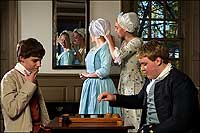
Stephen Hellier, Mackenzie Murphy, Heather Aadahl, and Thomas Snyder while the holiday hours with checkers.
Sometimes the complaints about Christmas reveal racism as well as class war. In 1772, a Manhattan newspaper attacks "the assembling of Negroes, servants, boys and other disorderly persons, in noisy companies in the streets, where they spend their time in gaming, drunkenness, quarrelling, swearing, etc., to the great disturbance of the neighborhood."
THE LADS AT THE COLLEGE of William and Mary's Grammar School, as you might expect, used the arrival of Christmastide to let off steam. There was the practice of barring the classroom door against the teachers to signal an early start to the school holiday. This is an English custom that had been forbidden in Williamsburg but was nevertheless followed.
Rowdy Christmas games are common among British students in the eighteenth century. At Cambridge, the custom of "riding the stang" at Christmas meant forcing a tiresome student to ride a pole carried on his classmates' shoulders, a form of public humiliation.
A New Year's Day version of this had a crowd of revelers forcing passers-by either to ride on the stang or to pay a forfeit, which was used to buy drinks for the stang carriers. In a town celebrated for its tarring and feathering of Loyalists, it's unlikely that this widespread English custom would be set aside.
Another sort of game associated with schoolboys, but often overlooked when we consider old Christmas customs, is the staging of plays, mainly religious but with plenty of secular and entertaining byplay. In 1755, the Maryland Gazette reported that the boys at the new Westminster School in London were to have, in addition to a hall, "a Theatre to act their Christmas plays in."
Certainly, throughout the year the Grammar School boys regularly mounted productions of Latin plays by Plautus and Terrence. In the 1780s, young John Randolph of Roanoke was said to be acting in such plays. On November 16, 1751, John Blair records in his diary that he's dismayed that a teacher called Mr. Preston, overacting the "drunken peasant" role in Cato, has torn down the curtains during rehearsal. The entry hints at the violence school plays could provoke.
Moreover, according to school regulations, if the scholars at the Grammar School attempted to put on plays "which are not to be found extant in any printed Books," the schoolmaster was supposed to step in and compose a fit play for the young scholars, so that they "may learn at all Times to speak Latin in apt and proper Terms." What's almost being stated is the necessity of keeping play and "plays" under wraps.
Student plays at Christmas have a long pedigree. When a troupe of traveling players put on some wildly popular Christmas plays in London during the reign of Richard II, they stole audiences from the school plays. A petition to protect the income of the lads and their masters at St. Paul's School was put before the king in 1378.
Written about 1450, the "Christmasse game made by maister Benet" is a simple entertainment in which God calls each of the twelve apostles in turn to heaven with a verse stanza detailing each saint's good deeds. The author is thought to be Bishop Benedict Burgh, who wrote the piece for the education of the son of the Earl of Essex. It's more pageant than drama, but includes plenty of opportunity for pantomime in the lines on, say, the crucifixion of St. Andrew or the flaying alive of St. Bartholomew:
O mighty martir, righte owte of thyne owne skynneIT STANDS TO REASON that some of that medieval piety and fascination would devolve to the children of Williamsburg every December. Consider, for instance, how even an insignificant hand game like cat's cradle could conspire to set a child and his family thinking seriously about Christmas. The game's original name, "cratch cradle," harks back to the manger, or cratch, where Christ was born. "From his cratch to his cross," a man wrote in 1656, "he suffered many a little death all his life long." If you think about it, this game has little to do with cats and much ado with the shape of that tiny manger with its wooden cross-bracing.Thow were torne, and cruelly to-rente.
In the end, December 25 was a festival of joy, associated with and prompted by games. A momentary respite from ordinary cares, it was a time for reflection. And it was entirely proper that Christmas should also occasion irony and grief for Christians, and not just medieval ones. For there could be only one end for the Son of Man. The flawless babe, as Scripture foretold, would soon become the Man of Sorrows. To be seen as defeating Death, you have to die. Games, in which you may lose today but come back to win tomorrow, were a way of understanding all that.
Michael Olmert wrote Williamsburg's Long Christmas for the 2004 holiday issue. He teaches English at the University of Maryland and was recently inducted into its Alumni Hall of Fame.

